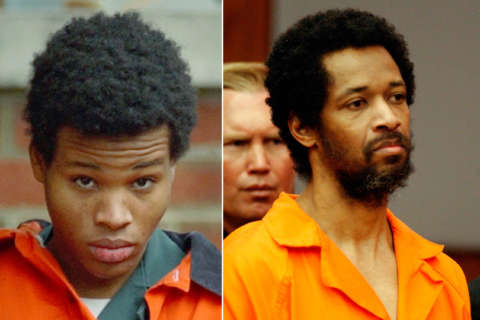WASHINGTON — Lawyers argued Thursday in a Montgomery County courtroom as to whether Lee Boyd Malvo, one of the D.C. snipers who terrified the area in 2002, should be resentenced.
Malvo, 32, was 17 when he was arrested. He received 10 life sentences in the series of shootings — six in Montgomery County, Maryland, and four in Virginia — and is currently in prison in Virginia.
Malvo wasn’t in court Thursday. His public defender, James Johnston, argued that he was subjected to mandatory life sentences, a punishment the U.S. Supreme Court ruled unconstitutional for juveniles in 2012, violating the Eighth Amendment protection against cruel and unusual punishments. Last year, the court determined it should be applied retroactively.
Montgomery County State’s Attorney John McCarthy argued that Malvo’s sentence wasn’t mandatory — that the plea deal he agreed to allowed the judge to impose any sentence he thought best, including the possibility of parole.
Late last month, Malvo argued a similar case in Virginia, and a federal judge in Norfolk ordered new sentencing hearings on two of Malvo’s life sentences there. Virginia Attorney General Mark Herring announced shortly thereafter that the commonwealth would appeal.
Assistant State’s Attorney Brian Kleinbord described Malvo’s crime as “the worst criminal act ever perpetrated on our community,” and argued that Maryland Circuit Judge James L. Ryan, who sentenced Malvo to six life-without-parole prison terms, took into consideration his age, his willingness to cooperate with the state and the fact that he expressed remorse for his crimes. Still, Kleinbord said, the judge determined such a sentence was appropriate.
“All that is necessary is a hearing in which a court can consider a defendant’s youth and circumstances before deciding if a life without parole sentence is appropriate,” Kleinbord said, adding that he believes the original sentencing hearing fulfilled that requirement.
But Johnston argued that while the judge considered those factors, he could not have given them as much weight as is now required in juvenile cases, because the case law requiring him to do so simply didn’t exist.
Malvo and John Allen Muhammad were convicted of killing 10 people in the D.C. area over a three-week span in October 2002. Muhammad was sentenced to death; he was executed in 2009.
“Life without the possibility of parole was a lawful sentence in Maryland and is a lawful sentence in Maryland for first-degree murder,” McCarthy told reporters after the hearing. He called Malvo “the poster child” for the rejection last year by Maryland’s General Assembly of a bill banning a sentence of life without the possibility of parole for a minor.
The proceeding was to determine whether Malvo should have a hearing to ask for a re-sentencing. Judge Robert Greenberg didn’t make a decision Thursday. He said he would study the issue and make a ruling.
WTOP’s Mike Murillo and The Associated Press contributed to this report.








